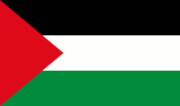.jpg)
Aida Refugee Camp, Palestine, May 30, 2015 (Source: Alexis Thiry)

PALESTINE
 Our Concerns
Our Concerns
- Arbitrary detention – particularly in the form of administrative detention – as well as the use of torture against Palestinians, including minors, by Israeli authorities;
- Severe crackdown on freedom of expression by both the Israeli and Palestinian authorities;
- Practice of torture and arbitrary detention by the Palestinian Authority in the West Bank and by Hamas in Gaza.
 Upcoming
Upcoming
- January 2018: Universal Periodic Review of Israel;
- June 2018: Adoption of the UPR outcome document by the Human Rights Council.
The year 2017 marked the 50th anniversary of the Six Day War between Israel and its neighbouring Arab countries, which resulted in Israel’s occupation of the West Bank, East Jerusalem and Gaza. On this occasion, the Special Rapporteur on the situation of human rights in the Palestinian Territory occupied since 1967, Michael Lynk, denounced the intensification of the “systemic human rights violations that accompany this occupation – collective punishment, confiscation of property, excessive use of force and unlawful killings, lack of freedom of movement and steady settlement expansion”.
In 2017, Israel pursued its settlement expansion policy despite calls from the international community to cease this practice. In this regard, the Israeli government has been working on the “Greater Jerusalem Bill” which would annex illegal settlements in the occupied West Bank to the Israeli-defined boundaries of the city of Jerusalem. In October, the Israeli Prime Minister requested that the vote on the text be delayed.
Over the course of the year, negotiations between Israel and the Palestinian Authority (PA) remained at a standstill. After U.S. President Donald Trump announced his decision to unilaterally recognise Jerusalem as the capital of Israel on December 6, Palestinian President Mahmoud Abbas declared that they would no longer accept the U.S. as a mediator in the peace process. On December 21, following a 128-9 vote, the UN General Assembly declared the president’s decision on Jerusalem “null and void”.
Following Trump’s statement, demonstrations erupted across the West Bank, East Jerusalem, and Gaza. The Israeli security forces responded with large-scale arrests and an excessive use of force, including with live ammunition, to disperse protesters. As a result, 16 people were killed, and thousands injured. The crackdown was most violent in Gaza, where, among others, a 29-year-old wheelchair-bound amputee was shot dead. The UN High Commissioner for Human Rights said that his killing was “incomprehensible” and “a truly shocking and wanton act.”
At the political level, in May, Palestinians in the West Bank went to the polls in the first local elections since 2012. However, the significance of the vote was undermined by a low voter turnout, as well as the polls’ boycott by Hamas, the Islamic Jihad group and the Popular Front for the Liberation of Palestine. These elections highlighted the rivalries between Fatah and Hamas, the former of which is headed by PA President Mahmoud Abbas, while the latter administers the Gaza Strip. The West Bank and Gaza have not voted together since 2006.
On October 12, following a decade-long split, Fatah and Hamas reached a unity agreement, coordinated by the Egyptian authorities. The deal stipulated that the Palestinian Authority would resume full administrative control of the Gaza strip by December 1. In exchange, the PA was expected to lift restrictions on electricity supply in Gaza, where two millions people suffer from worsening humanitarian conditions.
The two parties also agreed to hold general elections no later than the end of 2018. Nevertheless, the new reconciliation agreement remains precarious, as several efforts to create a unity government have failed in the past.

Human rights violations committed by Israel against Palestinians
Again this year, Palestinians saw their most basic rights violated by the Israeli authorities. Hundreds of Palestinians remain administratively detained under martial law – which is applicable in the occupied West Bank – without ever having been charged or tried. According to the Israel Prison Service, 434 Palestinians were held in administrative detention as of December 2017.
“Hundreds of Palestinians remain administratively detained under martial law – which is applicable in the occupied West Bank – without ever having been charged or tried.”
Administrative detention can last for an indefinite period of time, and is usually based on classified information, thus denying detainees the possibility of challenging the legality of their detention. Furthermore, administrative detainees are not granted the rights to access their lawyer, family members as well as independent doctors.
On August 31, Mohammad Abu Sakha, a 26-year-old circus performer, was released after more than a year and a half in an Israeli prison without charge or trial. He was arrested by the Israeli army on December 14, 2015, while crossing the Zaatara military checkpoint near Nablus. Ten days later, a military court ordered his administrative detention for six months, alleging that he carried out “illegal activities” with the Popular Front for the Liberation of Palestine. Though he denied this accusation, the military prosecution did not disclose any evidence, making it impossible for him to challenge the legality of his detention. For a year and a half, he was held under a series of administrative orders that were regularly renewed.
Furthermore, detainees continue to be subjected to acts of torture. It is common that following their arrest, suspects are held incommunicado and subjected to acts of torture such as sleep deprivation, beatings, and verbal threats while being interrogated, in order to confess. Confessions – redacted in Hebrew and signed under coercion by Palestinian suspects – are commonly relied upon as the main piece of evidence in Israeli military courts.
“Palestinians have seen their right to freedom of opinion and expression greatly restricted by the Israeli authorities in recent years.”
Palestinian children continue to be routinely arrested and brought before military courts – widely criticised for their jurisdiction over civilians and their lack of respect for fair trial guarantees – for security offences, the most common of which being stone throwing, which carries penalties of up to 20 years’ imprisonment. Children are arrested without warrants, and often beaten up, strip searched, shackled and blindfolded during the arrest.
They are subsequently interrogated for several hours without the presence of their lawyer or their parents, shackled and subjected to verbal abuse and insults. They are systematically shown documents written in Hebrew during interrogation, which they are forced to sign.
Finally, Palestinians have seen their right to freedom of opinion and expression greatly restricted by the Israeli authorities in recent years. According to the Palestinian Commission of Detainees’ and Ex-Detainees’ Affairs, 280 Palestinians have been arrested since early October 2015, the beginning of what has been described by observers as the “third Intifada”, which began with clashes between Palestinians and the Israeli security forces in Jerusalem. These 280 individuals were arrested after they had posted remarks, pictures or photos on different social media platforms.
This was the case of Palestinian poet Dareen Tatour, who was arrested on October 11, 2015, and indicted with “incitement to violence” and “support of a terrorist organisation” by the Magistrates’ Court in Nazareth. The two charges were based on her poetry, as well as her activity on social media. She has been under house arrest since January 2016, where she is required to wear an electronic ankle bracelet and remains deprived of access to the internet. In December 2017, Alkarama sought the urgent intervention of the UN Special Rapporteur on the promotion and protection of the right to freedom of opinion and expression, requesting that he urge the Israeli authorities to put an end to Tatour’s house arrest and that all charges held against her be dropped.
.

Human rights abuses committed by the Palestinian Authority in the West Bank, and by Hamas in the Gaza Strip
In 2017, Palestinians were subjected to abuses by the Palestinian Authority in the West Bank and by Hamas in the Gaza Strip. In Gaza, three men convicted of involvement in the killing of a Hamas leader were executed on April 6. They had been tried by a field military court on charges of treason and “collaboration with the occupier”. The UN High Commissioner for Human Rights condemned these executions, considering that the imposition of their death sentence did not meet international fair trial standards since allegations of torture and the extraction of confessions thereof were not investigated, as well as the fact that civilians should not be tried before military courts.
“Violations of the right to freedom of expression severely increased in 2017.”
Furthermore, the Independent Commission for Human Rights, the national human rights institution of Palestine, received dozens of cases of arbitrary detention – including those arising from the refusal to implement court rulings or acquittals, or detentions ordered by the governor on political grounds – as well as cases of torture.
The case of Imad Abou Rizk illustrates such practices. Abou Rizk, a 44-year-old sergeant in the Palestinian General Intelligence, was released from the premises of the Palestinian Authority’s Military Intelligence prison in Jericho on March 3, 2017. He had been arrested on November 6, 2016, and brought to the Military Intelligence prison, where he was interrogated and severely tortured. He was detained incommunicado for a week before he was allowed to call his wife for the first time. When, in January 2017, he started a hunger strike to protest against his conditions of detention, the authorities denied him the right to contact his wife, and eventually kept his place of detention concealed for more than two weeks.
Lastly, violations of the right to freedom of expression severely increased in 2017. Between June 12 and 15, the PA’s Public Prosecutor issued orders to block access to at least 12 news websites within the West Bank. All targeted news agencies’ websites are believed to convey opinions critical of the PA, raising concerns that this measure was aimed at restricting free speech.
Subsequently, on June 24, President Mahmoud Abbas issued a presidential decree approving the “Law on Electronic Crimes”. The text severely hinders online freedom of expression, since it punishes any crime “committed online” which “harms national unity or social harmony” with hard labour – which is, in practice, imprisonment – for 3 to 15 years. It also mandates internet service providers to cooperate with security agencies by collecting, storing, and sharing users’ information data for at least three years, in addition to blocking any website on the orders of the judiciary.
Palestinian media outlets and civil society organisations criticised the new legislation and its violation of the right to freedom of expression and privacy, and called for its immediate reversal. However, weeks after its adoption, the authorities arrested several journalists as well as human rights defender Issa Amro of Youth Against Settlements. He was arrested on September 4 on charges of, among others, “disturbing the public order” under the new Cybercrime Law for having posted comments on Facebook critical of the PA. Although he was released on bail on September 10, his case illustrates the concerning escalation of the authorities’ crackdown on freedom of speech.
